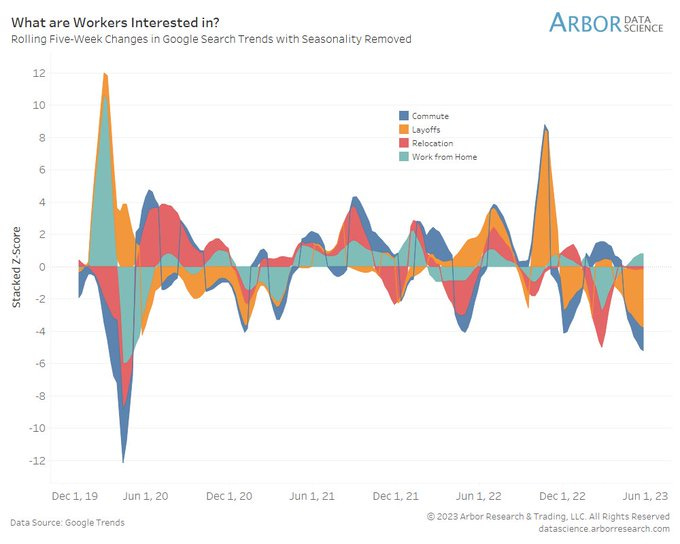New Homes > Old Homes
AI Things, WFH is good (reprise), New Homes>Old Homes, FAA and the misallocation of talent. Reads on VC in India, NVIDIA data, EU blocks the sun, office bets, more
A good evening to you, and you, and you, and you.
Some thinks:
AI Doing Stuff (legal and AI)
WFH is good (reprise)
New Homes > Existing Homes
FAA, a staffing shortage and Peter Turchin
Some reads:
Limits of VC in India
Nvidia in alt-data
The EU wants to block the sun (not The Onion)
Big Bets on Office
Justifying the price of DataBricks’ $1.3B acquisition of MosaicML
That is all. You will be expected to know it for the final exam.
Random Walk Thinks
AI doing stuff
A very big legal research company has purchased a very small legal research company for $650M in cash because the very small company built a cool AI tool for lawyers:
Thomson Reuters Corporation ("Thomson Reuters") (NYSE / TSX: TRI), a global content and technology company, today announced it has signed a definitive agreement to acquire Casetext . . . [Founded in 2013] Casetext employs 104 employees, and its customers include more than 10,000 law firms and corporate legal departments.
Casetext was granted early access to OpenAI's GPT-4 large language model, allowing it to develop solutions with the new technology and refine use cases for legal professionals. Its key products include CoCounsel, an AI legal assistant launched in 2023 and powered by GPT-4 that delivers document review, legal research memos, deposition preparation, and contract analysis in minutes.
Congrats to everyone involved. AI is not going to displace lawyers—not because it can’t, but because it’s against the law—but it’s definitely going to make their lives different, and perhaps easier and better.
In our paper published today in Nature, we introduce AlphaDev, an artificial intelligence (AI) system that uses reinforcement learning to discover enhanced computer science algorithms – surpassing those honed by scientists and engineers over decades.
AlphaDev uncovered a faster algorithm for sorting, a method for ordering data. Billions of people use these algorithms everyday without realising it. They underpin everything from ranking online search results and social posts to how data is processed on computers and phones . . .
To train AlphaDev to uncover new algorithms, we transformed sorting into a single player ‘assembly game’. At each turn, AlphaDev observes the algorithm it has generated and the information contained in the central processing unit (CPU). Then it plays a move by choosing an instruction to add to the algorithm..
The assembly game is incredibly hard because AlphaDev has to efficiently search through an enormous number of possible combinations of instructions to find an algorithm that can sort, and is faster than the current best one.
Nothing to worry about.
Meanwhile, big companies (and not VC), pile into AI investing:
Runway AI Inc., whose artificial intelligence software can create a short video from just a few typed words, has raised $141 million in funding from Alphabet Inc.’s Google, Nvidia Corp., Salesforce Inc. and other investors . . .
Runway is at the leading edge of a global surge in interest in AI. So far this year, investors have poured billions into AI startups, particularly companies that focus on generative AI, which takes inputs like written prompts and generates new content such as a poems or images. Yet while a growing number of startups have produced AI chatbots and image generators, video is still very much in its infancy and could present a new frontier for AI technology.
In fairness, some VCs were involved earlier. Still, the participation of “Corporate VC” (i.e. big cos) is anecdotally striking, but also consistent with what RW would expect.
WFH is good (reprise)
Random Walk made the bold claim that WFH isn’t going anywhere, despite the recent rumblings to the contrary (and that’s a good thing). Well, it’s been exactly two weeks, and I’m officially spiking the football:
The glass is once again half-empty.
On the other hand, search interest in “work from home” has inched up slightly (while “commute” and “layoffs” have gone down):
Perhaps that means people are actively looking for WFH opportunities (after having received a back-to-the-office edict)? I don’t know really.
Vox made the observation that smaller tech companies are, more than anyone, carrying the torch for fully remote work:
The hypothesis (which is sound), is that smaller companies are using WFH as perk to siphon top talent from the big players (citing AirBnb and Yelp specifically, as “bigger” versions of those smaller players). Insofar as success is a game of tail outcomes, then if the very best insist on WFH, it’s another reason to think the convention will persist.
That, and Bend, Oregon will be a very unusual place . . . with either (or both) the most talented engineers in the world, and/or the most plug-in-play, no-oversight-needed ham-n’-eggers around:

Finally, some data to support my claim that “slackers gonna slack” except that, in the office, slacking may be more disruptive than at home. Survey data says that WFH breaks are more likely to include exercise, chores, and childcare, as opposed to office breaks, which are more likely to include scrolling and gossip (but that breaks are basically the same):
It confirms my priors, therefore it must be true. Those are the rules.
New homes > Old homes
In the spirit of self-congratulation, I couldn’t be more right about new v. existing home dynamic. New home sales surprised everyone (but RW), by jumping 12.2% MoM (over a projected 1.2% decline):
Over a longer period of time, the divergence between new and existing is pretty easy to eyeball (but mind the two y-axes):








